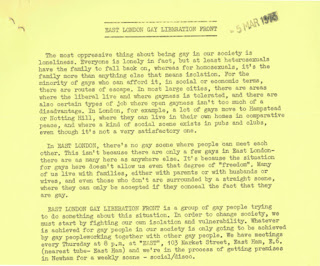February is LGBT+ History Month, and I wanted to highlight some of the related items in our collection of material from Liberty. The collection contains hundreds of files relating to many different subjects, and there are quite a number relating to LGBT+ rights and campaigning over the years.
Looking through a set of files from the late 1970s, one theme which emerged strongly was loneliness and a search for connection (something which might resonate for a lot of us after the last year). It can be hard to recall a time before the internet allowed people to find like-minded friends and partners from all over the world, but it’s not very long ago that such a thing sounded like pure science fiction.
Some LGBT+ people in the 1970s and 1980s struggled with feeling alone and isolated, especially if they weren’t living in major urban areas. To help people to connect with each other small organisations sprang up, and spread their messages by means of leaflets, meetings, and posters. The Liberty archive contains a number of leaflets relating to these groups.
This flyer is from the group Sequel, which described itself as "for isolated lesbians".
 |
| Extract from file U DCL/701/10 |
The group also had a publication called "Sequel", which contained members' "poems, short stories, personal experience etc." It encouraged "Developing a feminist awareness by reporting… blatant incidences of sexism in the press and complaining to advertisers, the Advertising Standards Authority etc.", and promoted the cause of animal liberation. Women could also write short personal pieces for "Sequel" to allow them to connect with each other.
This leaflet is from the East London Gay Liberation Front, and describes the isolation felt by gay people living in the area: "The most oppressive thing about being gay in our society is loneliness... In East London, there's no gay scene where people can meet each other. This isn't because there are only a few gays in East London - there are as many here as anywhere else. It's because the situation for gays here doesn't allow us even that degree of 'freedom'."
 |
| Extract from file U DCL/701/11 |
These documents, and other similar ones within the collection, show that people have always reached out to find others like them. Today that might look a little different, with Zoom and Facebook instead of flyers and social nights, but the impulse is the same.
If you want to investigate the Liberty collection further, you can search it in our online catalogue. If you’re interested in finding out what material Hull History Centre holds about LGBT+ history, and other under-researched groups, have a look at our Diversity in Archives Skills Guide.

No comments:
Post a Comment
Comments and feedback welcome!